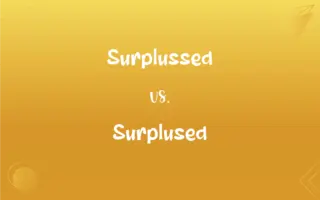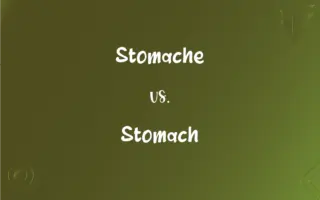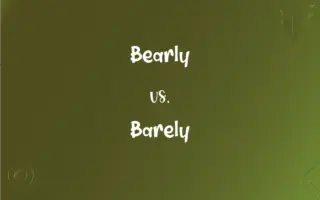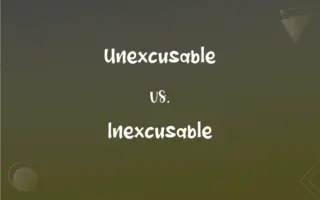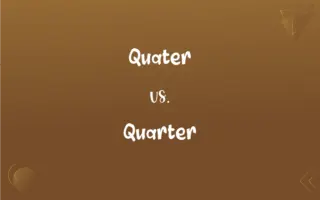Faling vs. Failing: Mastering the Correct Spelling
Edited by Aimie Carlson || By Janet White || Published on March 7, 2024
"Faling" is an incorrect spelling, while "failing" is correct. Failing refers to not succeeding in achieving a goal.

Which is correct: Faling or Failing
How to spell Failing?

Faling is Incorrect

Failing is Correct
ADVERTISEMENT
Key Differences
Think of "I am failing," to remember the correct spelling includes "I."
Double "l" in "failing" signifies the act of falling short, unlike the single "l" in the incorrect "faling."
"Ail" in "failing" suggests discomfort or failure, unlike "al" in "faling."
Associate "failing" with "falling" in terms of performance; both have a double "l."
Remember, "fail" needs an extra "l" to form "failing," indicating a continuation or process.
ADVERTISEMENT
Correct usage of Failing
I'm not just faling at this task, I'm learning from it.
I'm not just failing at this task, I'm learning from it.
The project was faling because of poor planning.
The project was failing because of poor planning.
The company was faling to meet its quarterly sales targets.
The company was failing to meet its quarterly sales targets.
He was afraid of faling and not meeting his parents' expectations.
He was afraid of failing and not meeting his parents' expectations.
She kept faling her math tests despite studying hard.
She kept failing her math tests despite studying hard.
Failing Definitions
Not achieving a passing grade.
He was worried about failing his math test.
A flaw in character or ethics.
His dishonesty was seen as a moral failing.
A breakdown or malfunction.
The engine's failing was due to overheating.
Deterioration in physical or mental condition.
Her health was failing, making daily tasks difficult.
Not meeting economic goals or bankruptcy.
The startup's failing was due to poor market research.
The act of a person or thing that fails; a failure.
A minor fault.
Failing Sentences
The fear of failing can sometimes be more paralyzing than actual failure.
Failing is part of the learning process and leads to growth.
She was failing to see the importance of teamwork in the project.
After failing several times, he finally perfected the recipe.
He kept failing to wake up on time for his early morning classes.
Students often fear failing exams more than they focus on learning.
Failing a test doesn't mean you can't succeed in the subject.
The system was failing to process the data correctly.
They were failing to communicate effectively, which led to misunderstandings.
Failing the driving test the first time made her more determined to pass the next time.
Failing to update the software regularly can lead to security vulnerabilities.
The business was failing due to a lack of innovation.
They were failing miserably at keeping the surprise party a secret.
Failing the final exam would mean retaking the course.
By failing to save enough money, they couldn't afford the vacation they wanted.
By failing to plan, you are planning to fail.
Failing to adhere to the guidelines resulted in disqualification.
Failing to secure the campsite attracted wildlife overnight.
She learned more from failing the competition than from her previous victories.
Failing to recharge the battery led to the device shutting down unexpectedly.
Despite failing initially, they continued to pursue their entrepreneurial dream.
She criticized the government for failing to address the issue.
Failing isn't the opposite of success; it's a step towards it.
Failing at something doesn't define your intelligence or worth.
His failing health was a concern for the entire family.
FAQs
What is the pronunciation of failing?
It's pronounced as /ˈfeɪlɪŋ/.
What is the root word of failing?
The root word is "fail."
Which preposition is used with failing?
"In" is commonly used, as in "failing in duty."
What is the verb form of failing?
The verb form is "fail."
Which vowel is used before failing?
"A" is typically used before "failing," as in "a failing effort."
Which article is used with failing?
"A" or "the," depending on context.
Is failing an adverb?
No, failing is not an adverb.
Is failing an abstract noun?
Yes, when referring to the concept or act of failing.
Is failing a noun or adjective?
It can be both, depending on usage.
Why is it called failing?
It comes from the verb "fail," indicating a lack of success.
Is failing a negative or positive word?
Negative, as it denotes a lack of success.
Is failing a countable noun?
It's generally uncountable when referring to the concept; countable when referring to specific instances.
Is failing a collective noun?
No, it's not used as a collective noun.
What is the plural form of failing?
"Failings" when referring to multiple failures or flaws.
Which conjunction is used with failing?
"And" when listing multiple failures or shortcomings.
What is a stressed syllable in failing?
The first syllable, "fail," is stressed.
What part of speech is failing?
Failing is a noun or an adjective, depending on context.
What is the third form of failing?
"Failed" is also the third form (past participle).
What is the singular form of failing?
"Failing" can serve as both singular and plural, depending on context.
Is failing a vowel or consonant?
The word starts with a consonant.
Is the failing term a metaphor?
It can be used metaphorically to describe weaknesses or shortcomings.
How many syllables are in failing?
There are two syllables in "failing."
What is another term for failing?
Shortcoming, deficiency, or fault can be synonyms.
Which determiner is used with failing?
"The," "a," or "an," depending on specific usage.
Is the word failing imperative?
No, failing is not used in the imperative mood.
How do we divide failing into syllables?
It's divided as fail-ing.
What is the opposite of failing?
Success, achievement, or accomplishment.
What is the first form of failing?
"Fail" is the base or first form.
What is the second form of failing?
"Failed" is the second form (past tense).
How is failing used in a sentence?
"Despite his failing health, he remained optimistic."
About Author
Written by
Janet WhiteJanet White has been an esteemed writer and blogger for Difference Wiki. Holding a Master's degree in Science and Medical Journalism from the prestigious Boston University, she has consistently demonstrated her expertise and passion for her field. When she's not immersed in her work, Janet relishes her time exercising, delving into a good book, and cherishing moments with friends and family.
Edited by
Aimie CarlsonAimie Carlson, holding a master's degree in English literature, is a fervent English language enthusiast. She lends her writing talents to Difference Wiki, a prominent website that specializes in comparisons, offering readers insightful analyses that both captivate and inform.



